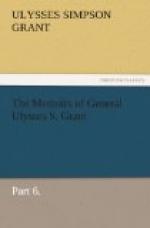I do not remember what the instructions were the President gave me, but I know that Governor Smith was not permitted to perform the duties of his office. I also know that if Mr. Lincoln had been spared, there would have been no efforts made to prevent any one from leaving the country who desired to do so. He would have been equally willing to permit the return of the same expatriated citizens after they had time to repent of their choice.
On the 18th of May orders were issued by the adjutant-general for a grand review by the President and his cabinet of Sherman’s and Meade’s armies. The review commenced on the 23d and lasted two days. Meade’s army occupied over six hours of the first day in passing the grand stand which had been erected in front of the President’s house. Sherman witnessed this review from the grand stand which was occupied by the President and his cabinet. Here he showed his resentment for the cruel and harsh treatment that had unnecessarily been inflicted upon him by the Secretary of War, by refusing to take his extended hand.
Sherman’s troops had been in camp on the south side of the Potomac. During the night of the 23d he crossed over and bivouacked not far from the Capitol. Promptly at ten o’clock on the morning of the 24th, his troops commenced to pass in review. Sherman’s army made a different appearance from that of the Army of the Potomac. The latter had been operating where they received directly from the North full supplies of food and clothing regularly: the review of this army therefore was the review of a body of 65,000 well-drilled, well-disciplined and orderly soldiers inured to hardship and fit for any duty, but without the experience of gathering their own food and supplies in an enemy’s country, and of being ever on the watch. Sherman’s




